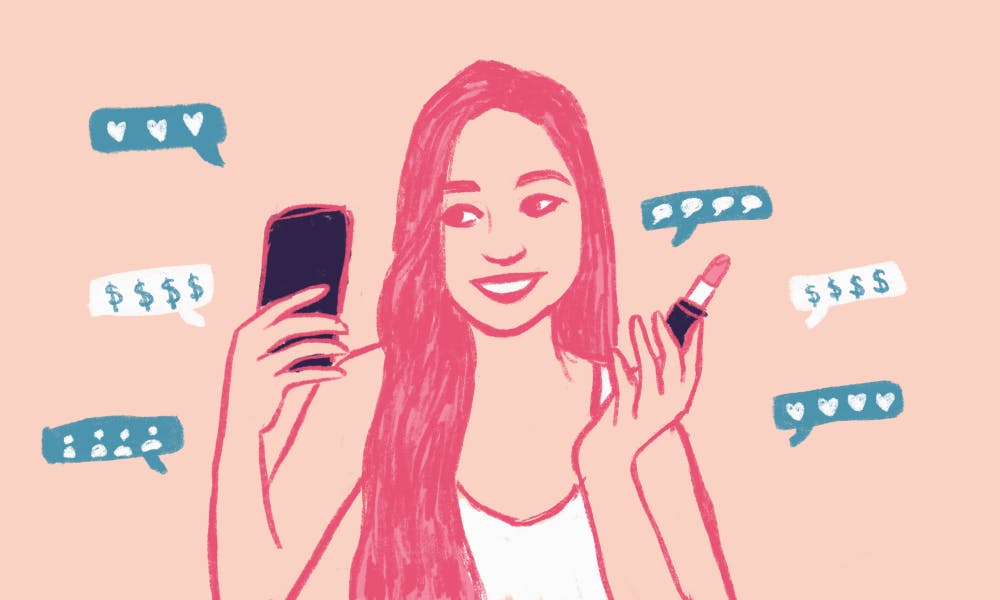It’s no secret that our social media feeds are full of advertisements. Whether it’s promoted posts from accounts we don’t even follow or paid partnerships between our favorite influencers and brands, it can be overwhelming to realize that many of the posts we see on our feed are encouraging us to spend money.
While these advertisements can either be viewed as an issue or an inspiration depending on your perspective, there’s no hiding the fact that most of us have purchased things under the influence—the influence of social media advertising, that is. However, there is a hierarchy to influencers that most consumers aren’t entirely aware of.
It's pretty difficult to avoid the barrage of Instagram stories from big influencers thanking brands for what seems like an endless stream of luxury gifts. A well–known example would be Kylie Jenner, especially now that she has a baby. Not only does she get sent expensive makeup products and designer clothes, but also toys, books, and clothes for her daughter, Stormi. If you're anything like me, there are always those pangs of materialistic jealousy when you see all of those free gifts, but what happens after those gifts are given isn't often heard of.
In the United States, influencers aren’t required to tell you that a product was gifted to them when they continue to feature it on their profile after the first time they mention it. They may get a slap on the wrist from the Federal Trade Commission, but nothing else comes out of it. They still make money by not informing you. For example, imagine your favorite beauty blogger is wearing a lipstick and you want to know which brand makes it so you can buy it. They link to it on their profile, maybe using an affiliate link (from which they get a commission if you buy the lipstick from that link), and you purchase it. You might think this was a completely authentic recommendation, but that lipstick might have been completely free to that influencer and there’s no way for you to know. The recommendation was made by that influencer, and no one was forcing them, but because they got it for free they might have felt the need to promote it out of kindness. Even if they did genuinely like it, they didn’t have to spend their own money to purchase the product like a regular consumer would. In short, Kylie doesn't have to tell you if Stormi's expensive outfit or her designer shoes were completely free of charge to her.
While there isn’t anything inherently wrong about gifted items, there is something wrong about the consumer not being fully informed about it. That’s why the United Kingdom’s Advertising Standards Authority has recently tightened their laws concerning gifted items or experiences and are holding British influencers accountable when they don’t follow the law. British influencers now need to disclose every single time they feature a gifted item on any form of social media, regardless of whether they have disclosed it before. American laws have not followed suit as of April 2019.
To get an American, on–campus perspective on the influencer business, I talked to Jennifer Hu (W’ 20), a part–time Instagram influencer and a Penn student studying Marketing and Business Analytics, making her not only someone who understands the business of Instagram marketing from the side of the influencer, but also from the brands' perspectives.
Jennifer has done paid partnerships before, with Raw Sugar being her most recent one, but she admits that even though she plays by the rules, many companies don’t. Jennifer explained, “They tend to use younger people because they’re more impressionable. They’re like: ‘we’ll give you a free pair of jeans’ … then they don’t follow through with anything."
Jennifer also ruminated on the implications of gifted products for the influencer, saying,"They kind of just use it as a way to incentivize people to drive whatever they want … it can’t be a full time career if [influencers] are only being gifted these products … if that’s how they’re being paid, then that means they’re not really being valued.” When she said this, I realized how ignorant I had been in assuming that the problematic aspects of gifted items only affected the consumer.
When asked about the influencer realm in general, Jennifer made it clear that she wasn’t a big fan of the term itself in the first place.
“I personally don’t like the term ‘influencer’ because that’s in every context now. And when people think of influencer they kind of just think of Kylie Jenner, Olivia Jade … influencer is a little bit out there. What are you influencing? … There needs to be a lot of reframing of that word," she said matter of factly, assuring me that a lot of people would agree with that opinion.
Regardless of which term is used, Jennifer emphasized the problematic nature of the "influencer" realm in general. She wishes influencers focused more on their local communities and small businesses rather than on large corporate brands, like she tries to do with her Instagram.
Even though Jennifer still classifies herself as an "influencer," she was surprisingly candid, and confidently noted the issues the community has with paid partnerships. She described the current lack of guidelines about advertised content social media as "problematic," drawing on her own insecurities as an Instagram influencer herself.
"I have no way of knowing if [influencers] actually use the product. Truth be told, for every paid partnership, you’re not [going to] like every product that you’re given," she revealed. "And that’s okay, but you probably want to disclose it, because that destroys trust if you don’t.”







